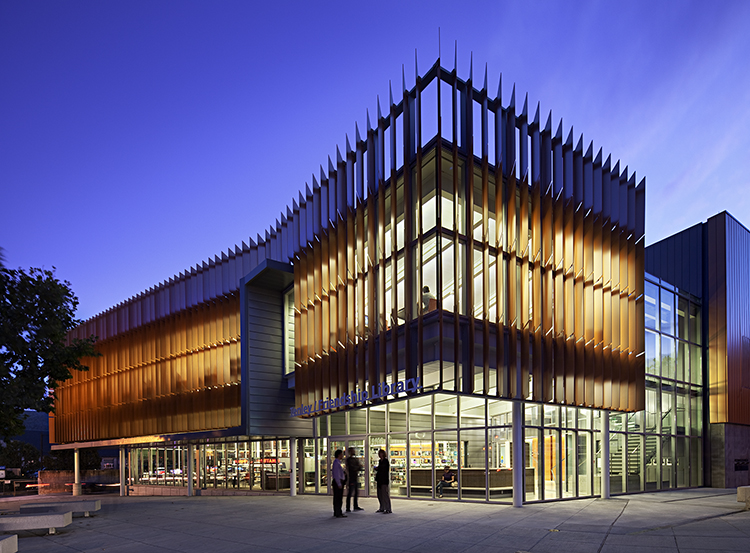Global architecture and design firm Perkins+Will announced today that they have signed an agreement which will result in The Freelon Group joining forces with Perkins+Will.
Founded by Phil Freelon, FAIA, LEED AP in Research Triangle Park, N.C., The Freelon Group is world renowned for design excellence and consulting work with museums, libraries, universities, and other civic and institutional clients.
Perkins+Will offers a full range of architectural expertise from its offices in Charlotte and RTP, notably to healthcare, science and technology, education, corporate, commercial, civic, and cultural clients. These capabilities will be enriched by The Freelon Group’s similar work, expanding the firm’s portfolio in these sectors. The combined practice will have nearly 80 professionals creating one of the largest and most award-winning architecture and design practices in North Carolina.
The Freelon Group will bring a portfolio of design achievements on behalf of some of America’s most respected cultural institutions including the Smithsonian Institution’s National Museum of African American History and Culture in Washington, D.C., the National Center for Civil and Human Rights in Atlanta, the Emancipation Park in Houston, the Museum of the African Diaspora in San Francisco, and multiple projects for the Washington, D.C. Public Libraries.

The Tenley Library, a Washington, D.C. Public Library designed by Freelon. Photo credit: Mark Herboth Photography
“By joining Perkins+Will, we can offer our clients in North Carolina and around the world a full spectrum of services for just about any type of project,” said Freelon. “The firms are ideally matched as we share a dedication to design excellence and commitment to social responsibility.”
Upon completion of the transaction, Freelon will assume a key leadership role at Perkins+Will in both North Carolina and globally. As the Managing and Design Director of the North Carolina practice, he will lead both Perkins+Will North Carolina offices in RTP and Charlotte. Freelon will come to Perkins+Will as an important member of the firmwide leadership team and will join the Board of Directors. He will also be a key leader for the firm's cultural and civic practice.
Freelon founded The Freelon Group in 1990. He is the recipient of the Thomas Jefferson Award for Public Architecture from the American Institute of Architects (AIA) and a member of the AIA College of Fellows.
He was appointed by President Obama to serve on the National Commission of Fine Arts and earned the academic appointment of Professor of Practice at the Massachusetts Institute of Technology (MIT) School of Architecture and Planning, where he will continue to be a member of the faculty.
Freelon has lectured at more than 30 major universities, museums, and other prominent venues, and his work has been published globally. A native of Philadelphia, Freelon earned his Bachelor of Environmental Design in Architecture degree from North Carolina State University and his Master of Architecture degree from MIT. He also received a Loeb Fellowship and spent a year of independent study at the Harvard University Graduate School of Design.
“With Phil Freelon, his experienced team of 40 designers, and other professionals who intend to join Perkins+Will, we look forward to offering clients a deeper level of cultural design expertise,” said Perkins+Will President and Chief Executive Officer Phil Harrison, FAIA, LEED AP. “Phil will further strengthen our leadership team and is a natural complement to the design excellence culture at Perkins+Will.”
Perkins+Will employees in the RTP office intend to relocate to The Freelon Group’s RTP office space. This office will work collaboratively with the Perkins+Will Charlotte office to service clients throughout North Carolina, nationally, and globally. Under Freelon’s direction, current Perkins+Will leadership will continue to serve the North Carolina practice, with David Brownlee in the role of Director of Operations in the RTP office and David Gieser as Director of Operations in the Charlotte office.
Related Stories
Building Technology | Jun 18, 2024
Could ‘smart’ building facades heat and cool buildings?
A promising research project looks at the possibilities for thermoelectric systems to thermally condition buildings, writes Mahsa Farid Mohajer, Sustainable Building Analyst with Stantec.
University Buildings | Jun 18, 2024
UC Riverside’s new School of Medicine building supports team-based learning, showcases passive design strategies
The University of California, Riverside, School of Medicine has opened the 94,576-sf, five-floor Education Building II (EDII). Created by the design-build team of CO Architects and Hensel Phelps, the medical school’s new home supports team-based student learning, offers social spaces, and provides departmental offices for faculty and staff.
Healthcare Facilities | Jun 18, 2024
A healthcare simulation technology consultant can save time, money, and headaches
As the demand for skilled healthcare professionals continues to rise, healthcare simulation is playing an increasingly vital role in the skill development, compliance, and continuing education of the clinical workforce.
Mass Timber | Jun 17, 2024
British Columbia hospital features mass timber community hall
The Cowichan District Hospital Replacement Project in Duncan, British Columbia, features an expansive community hall featuring mass timber construction. The hall, designed to promote social interaction and connection to give patients, families, and staff a warm and welcoming environment, connects a Diagnostic and Treatment (“D&T”) Block and Inpatient Tower.
Concrete Technology | Jun 17, 2024
MIT researchers are working on a way to use concrete as an electric battery
Researchers at MIT have developed a concrete mixture that can store electrical energy. The researchers say the mixture of water, cement, and carbon black could be used for building foundations and street paving.
Codes and Standards | Jun 17, 2024
Federal government releases national definition of a zero emissions building
The U.S. Department of Energy has released a new national definition of a zero emissions building. The definition is intended to provide industry guidance to support new and existing commercial and residential buildings to move towards zero emissions across the entire building sector, DOE says.
Multifamily Housing | Jun 14, 2024
AEC inspections are the key to financially viable office to residential adaptive reuse projects
About a year ago our industry was abuzz with an idea that seemed like a one-shot miracle cure for both the shockingly high rate of office vacancies and the worsening housing shortage. The seemingly simple idea of converting empty office buildings to multifamily residential seemed like an easy and elegant solution. However, in the intervening months we’ve seen only a handful of these conversions, despite near universal enthusiasm for the concept.
Healthcare Facilities | Jun 13, 2024
Top 10 trends in the hospital facilities market
BD+C evaluated more than a dozen of the nation's most prominent hospital construction projects to identify trends that are driving hospital design and construction in the $67 billion healthcare sector. Here’s what we found.
Adaptive Reuse | Jun 13, 2024
4 ways to transform old buildings into modern assets
As cities grow, their office inventories remain largely stagnant. Yet despite changes to the market—including the impact of hybrid work—opportunities still exist. Enter: “Midlife Metamorphosis.”
Affordable Housing | Jun 12, 2024
Studio Libeskind designs 190 affordable housing apartments for seniors
In Brooklyn, New York, the recently opened Atrium at Sumner offers 132,418 sf of affordable housing for seniors. The $132 million project includes 190 apartments—132 of them available to senior households earning below or at 50% of the area median income and 57 units available to formerly homeless seniors.

















